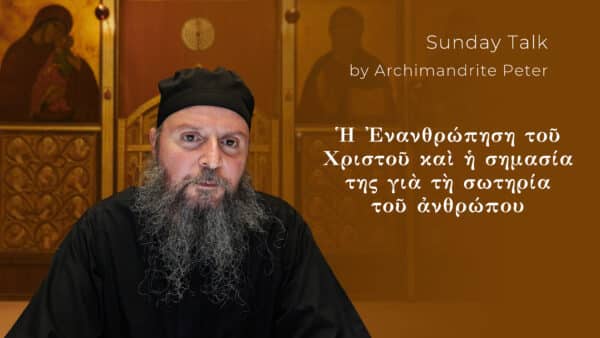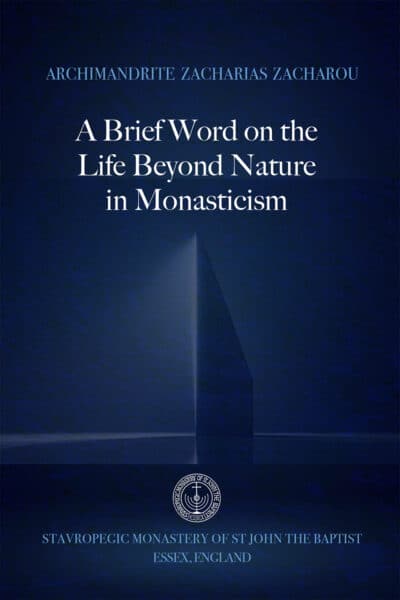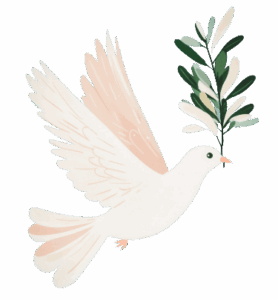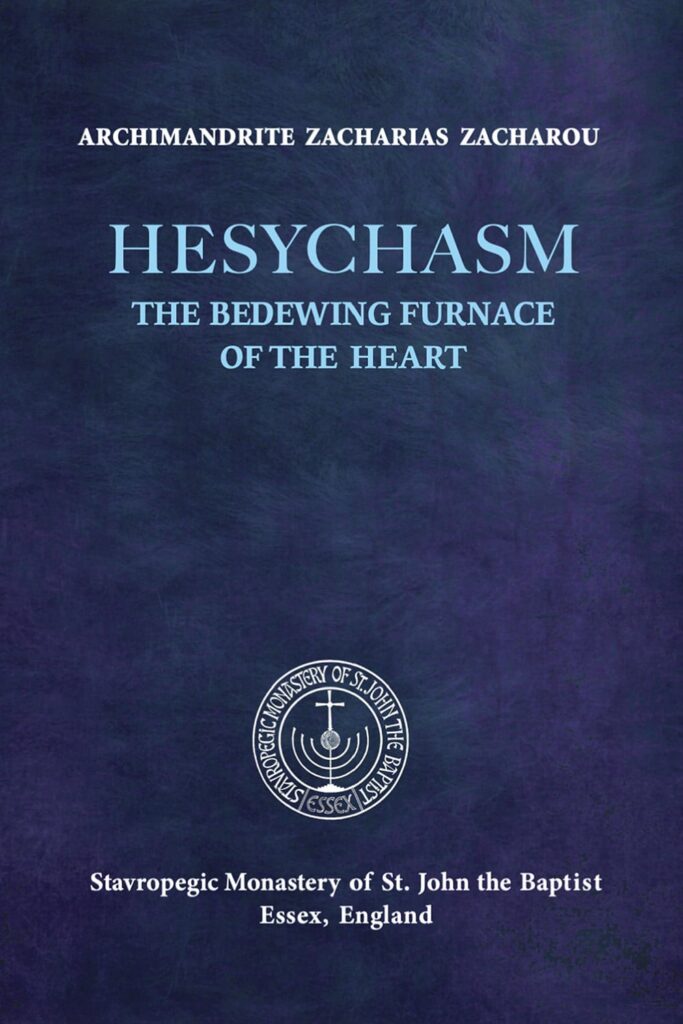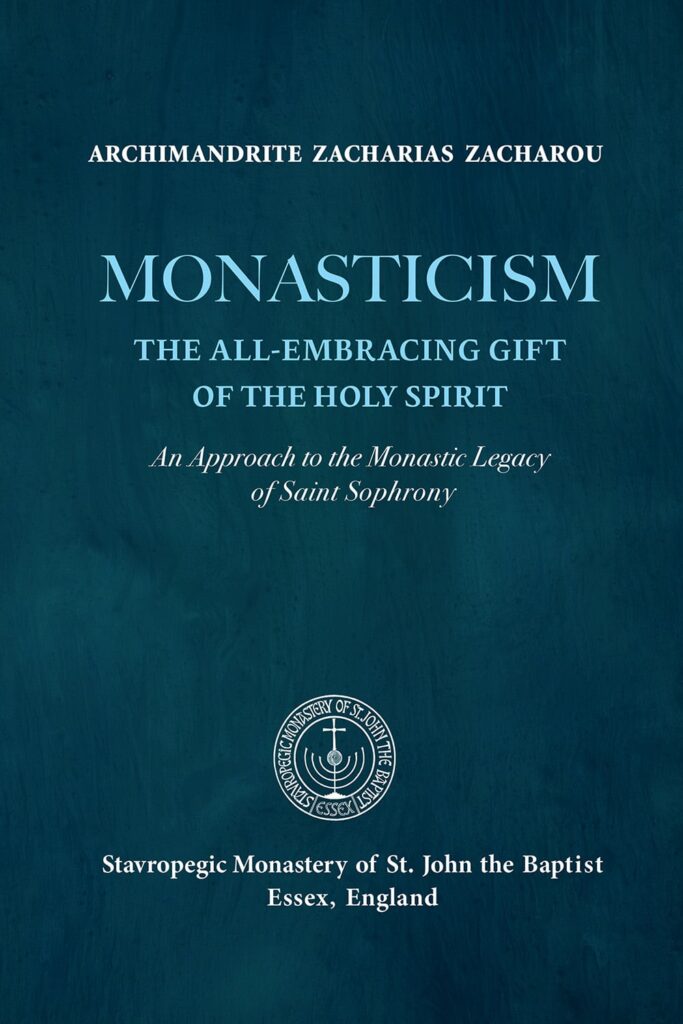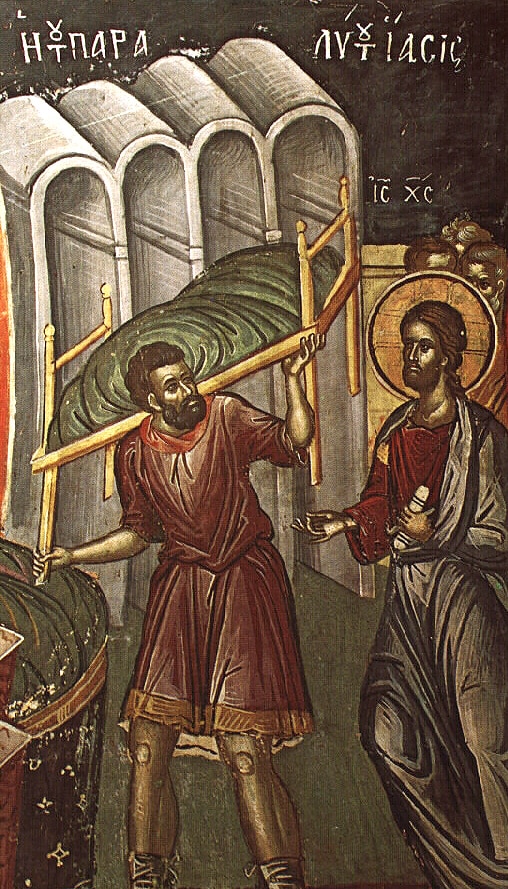Question: Does the painful struggle to keep our mind in prayer despite our many external tasks help us to obtain inner prayer?
Answer (Father Zacharias): The Elder had the experience of living as a hermit in a cave, and he gave us a principle. When a hermit limits his needs to the bare necessities and honestly offers to God all he can, God’s providence will care for him and provide what he needs in order to accomplish his godly purpose. God will grant him a spiritual state, longing and a noetic sensation in his heart, which he will rekindle again and again in his intimate relationship with the Lord Jesus. But as soon as he allows unnecessary cares in his life, adding certain kinds of food and other conveniences, then divine providence will not provide him with everything he needs and he will have to devote more time to work. In this way, he loses his freedom and becomes a slave. Our Elder used to say that in the monastery, too, if we do not undertake unnecessary expenses, God’s providence will not abandon us, but will defend us to the end and provide us with what is necessary for our life.
The same happens in our spiritual life. We see the fruits of hesychasm in people who live in the world, even though they do not have the privilege of hesychia. I knew a lady in Canada with thirteen children who had the prayer of the heart. She would get up at 4:00 in the morning, pray until 6am, then get her husband and children ready for work and school, and then resume her prayer. But she sought nothing more than what was absolutely necessary for life. And although her husband did not understand what was happening within her, he sensed that it was a spiritual mystery. Therefore, he respected and protected her, and they lived in peace. Let me tell you one more principle. Forgive me, I like very much the spiritual principles we received from our Elders as laws of life. Such principles are very beneficial for our days, because they give us the courage to better build our lives, without our minds being lured by different temptations, and to work out the perfection of our salvation in the circumstances in which we were placed by God’s providence. The Elder assures us with great conviction that if we perform the Divine Liturgy with proper preparation and longing to stand before God in a pleasing manner, then at the level of prayer we will have the same fruits as hesychastic prayer.
Question: You said that Saint Silouan lived in his heart as in a cave and from there he served his brothers. How can we acquire such a state?
Answer (Father Peter): Saint Paul calls it ‘the circumcision of the heart’.1Rom. 2:29. Just as the Israelites bore circumcision in the flesh as a sign that they were the people of God, so ‘the circumcision of the heart’ is the sign that man belongs to God. The quickest and most powerful way to circumcise the heart is through tears, which create a life-giving wound in the heart. If a thorn pierces my hand, then all day long, wherever I go, I cannot forget the pain; and if the thorn does not come out, I will find no rest. So too he who begins his day with the prayer of repentance, spends the rest of the day living in his heart, since the wound of mourning keeps him turned within, collected in himself. He feels that he possesses his nature, that he is the lord over his own being; when he says yes, it is yes, and when he says no, it is no.2Matt. 5:37. Then for the whole day, life becomes a continuous Liturgy, and every contact with his brethren can be a ‘savour of life unto life’; whereas, if he allows his heart to grow cold and harden, every encounter can become ‘a savour of death unto death’.32 Cor. 2:16. Of course, Saint Silouan had built this state within himself after a long and superhuman ascetic struggle, but this does not mean that it is not a pattern of life for all of us, an example for our resisting to sin.
Question (for both speakers): Could you explain to us how spiritual mourning helps us to live in our heart?
Answer (Father Zacharias): I would rather protect our Hegumen, who is younger; I am old and perishing. I was and continue to be the spiritual father of Father Peter, but now that he has become Hegumen, he has become my father. Thus, the word of Saint Symeon the New Theologian was fulfilled, that God did not create masters and slaves but fathers and sons, and the sons in turn become fathers. Father Sophrony explained to us that it was because Saint Nicodemus had the prayer in his heart, that he had all the time to write many books. Those who have convinced God that they are His own and He took them by the hand and guides them, have this gift of unceasing prayer, and they do not have the anxiety to make the effort to pray, but they have other ‘duties’ in their life. Yet, although they always bear prayer in their heart, even they need to withdraw at certain times during the day and undistractedly surrender to the upsurge and the workings of prayer in them alone with God. This is what the Fathers mean when they say the word incomprehensible for us that the saints ‘suffer things divine’. This happens when they give themselves over to the uprush of prayer in their heart.
Through the prayer of repentance, the monk finds his heart and offers worship to God with his whole heart, meaning that he becomes ‘cardiac’, not in the medical but etymological sense: he becomes a man of the heart. That is, he learns to live with his heart and to have the noetic and divine sensation mentioned in the Proverbs of the Old Testament. Man is a heart with a deep and noetic, spiritual sensation4Prov. 15:14; 18:15. Through spiritual mourning, man learns to live with one thought, with which he repents. He learns to confess with a single thought, and this makes easier the task of the spiritual fathers. He also learns to converse with others with one thought. It is wonderful to see how two spiritual people speak, skipping unnecessary intermediate thoughts and stages in their conversation; they limit their dialogue to the essence so that in one or two minutes, they can clarify the most serious matter in their life.
Question: What is the relationship between hesychasm and obedience?
Answer (Father Zacharias): In one word, obedience is an ascetical exercise that helps man to enter the presence of God, and practice of hesychastic prayer allows him to remain in that presence. For the truly obedient monk lives with two things in his mind: the word of his Elder and the Name of Christ; therefore, he renounces every other thought. Thus, he enters the presence of God and remains in the presence of God while continuing to call upon the Name of Christ before God with his mind in his heart. Obedience prepares him to enter the presence of God, and hesychasm preserves this miracle in the life of the man of prayer.
Monasticism
The All-Embracing Gift of the Holy Spirit. An Approach to the Monastic Legacy of Saint Sophrony
Question: Nowadays we constantly hear frightening news about catastrophes, wars and pandemics. But one of the fruits of hesychasm is that he who concentrates on prayer feels the presence and protection of God. If a man does not feel this protection, does it mean that he has not even started to walk this path of prayer or that he is walking it in the wrong way?
Answer (Father Peter): Saint Paul exhorts the Christians to strive for better things, to strive for the things that accompany salvation5Heb. 6:9. and he identifies as the essence of Christian life faith, hope and love61 Cor. 13:13.. But there cannot be true faith without love, nor true hope without faith which has been tried, without faith which is accompanied by a personal experiment of the Christian. He who will put faith to the test knows to which God he belongs; he does not believe in God merely theoretically. God becomes known and beloved to him and he knows that God is holding him by the hand. The apostle says that ‘even as they did not like to retain God in their knowledge, God gave them over to a reprobate mind’7Rom. 1:28. Therefore, it ultimately all comes down to this synergy of the human will with the will of God. He who tests his faith will acquire living hope.
The holy Father founder of our monastery believed that, if there is any hope and any future in the world today for greater unity according to the Gospel, that is, in the spirit of Christ’s commandments, this hope lies in the bosom of monasticism. For monks submit their lives to the most intense struggle to fulfil the commandment of Christ, to keep it spotless and blameless. Thus, where there is a struggle for the sake of the divine commandment, true unity in Christ is naturally achieved. It is well known that the time of Saint Gregory of Sinai was a rare period where one could see hesychast monks from different nations living together in the Balkan region. What made this possible? They were united by their common desire for hesychastic prayer. Therefore, in all the temptations that we see in the world today, there flows another parallel current: the current of the saints and of hesychasm, where the desire for prayerful stillness naturally brings unity.
Answer (Father Zacharias): Unfortunately, nowadays we are suffering in the Orthodox Church. It is not just a matter of experience, it is also a matter of education through the chastening of an Elder, because all pray with the prayer rope, but some become so zealotic that they even lose their minds. We need reverence, but we also need education through chastisement which will keep us within the boundaries of humility. We Orthodox, unfortunately, often have a fear of strangers that makes us defensive and zealotic, condemning everyone to hell and rejecting them without any dialogue. However, we should not be afraid, but ready to die for our faith, as Father Sophrony used to say, without losing a ‘jot’ from the perfect revelation we have received. For if we have fear fuelled by zealotism, without knowledge, then we will not be able to live a truly Christian life. If we Orthodox Christians want to bring a message to the whole world and help the whole world, we must live our tradition and express this life without fear, without confrontations, without hostility, and those who hear can themselves draw a conclusion in a safe and gentle way. This is what Father Sophrony expected of us, to be kind and charitable unto all; to give a word to all who ask us; to express our own life and tradition without fear and without confrontation; then others will draw their own conclusions.
Question: Could you say something about the life of Father Athanasius Yevtich, whom you knew personally when you studied theology in Paris?
Answer (Father Zacharias): I am unworthy to speak about these people of God, who were the ‘salt of the earth’8Matt. 5:13. Father Athanasius was a disciple of the holy Elder Justin, who taught without words; he was so humble and so saintly that while merely standing beside him, one felt the breeze of the Spirit. I mainly knew a few of them: Father Athanasius, with whom I lived for four years, Father Amphilochius Father Ireneus and Father John, whom I knew less. But the one of whom I was most in awe was Father Athanasius; he was the most perfect in every way – as a professor, a Christian, and an intellectual. He had a fierce thirst for God and a great love for all. At the Saint Sergius Institute, we were less than twenty students and lived in two dormitories. More than half lived ascetically, leading an austere life like monks. Father Athanasius showed even greater love and reverence toward his less diligent students, and he always tried to inspire them to improve both their studies and their spiritual life. Above all, what made him a truly apostolic man was that he knew how to honour each person who approached him.
Often, Catholic monks and theologians would come to seek his counsel on various matters, and he would help them with great patience and love. We do not know what became of these people afterward, for one plants a seed and does not know what fruit it will bring. But I admired how conscientiously he freely shared with all everything he had acquired through immense effort and asceticism, continuous study and prayer. He had the habit of working in the reading room with the students, and after 11:00, when everyone went to sleep, he would turn off the lights and begin his prostrations and prayers for an hour or two. Then he would come to the dormitory. Whenever there was a Liturgy, I would also try to pray a little as preparation. I would hear him holding some papers in his hands that made a rustling sound. Later, I learned that these were papers on which he had written prayers by Saint Justin, which he read as his final prayers before sleeping. We, too, had a few prayers from our Elder; one is especially wonderful for the beginning of the day. When he was in the desert, the Elder would pray for one hour with this prayer before starting his day.
A young man from Greece named Nikolaos, who had a very kind heart but no guidance from an Elder, came to the Institute seeking a spiritual father. Sometimes he would come to speak with me, but I told him that I was not even a monk and I advised him to go to Father Athanasius. Every evening, he would stand by the window to watch Father Athanasius doing his prayer rule. In a few days, he connected with him in a most beautiful and spiritual way; he progressed and became a good theologian and priest. Other young men, though they arrived at the Institute with faces distorted by their life in the world, after only two weeks would stand in church like pillars of prayer with radiant faces. This is how his positive and spiritual presence blessed our life. His lectures on ascetical theology were a monumental treasure. He would write them at night in Russian, give them to a French secretary, who would return the translation in French by morning. I imagine that was the best period of his life because he had no distractions; he only gave one or two lectures at the Institute and would go to the Louvre Museum library to research manuscripts. Once, he returned from the library, almost flying with joy. He said to me, ‘I found a treasure! I found the treatise of Gregory of Cyprus, the Patriarch of Constantinople.’ When I asked him to see the book, he replied, ‘Make the sign of the cross before touching the manuscript!’ I have recounted some incidents to describe the beautiful atmosphere we had with Father Athanasius, this perfect man of God, who influenced everyone with his holy life.
Footnotes
- 1Rom. 2:29.
- 2Matt. 5:37.
- 32 Cor. 2:16.
- 4Prov. 15:14; 18:15.
- 5Heb. 6:9.
- 61 Cor. 13:13.
- 7Rom. 1:28.
- 8Matt. 5:13.
